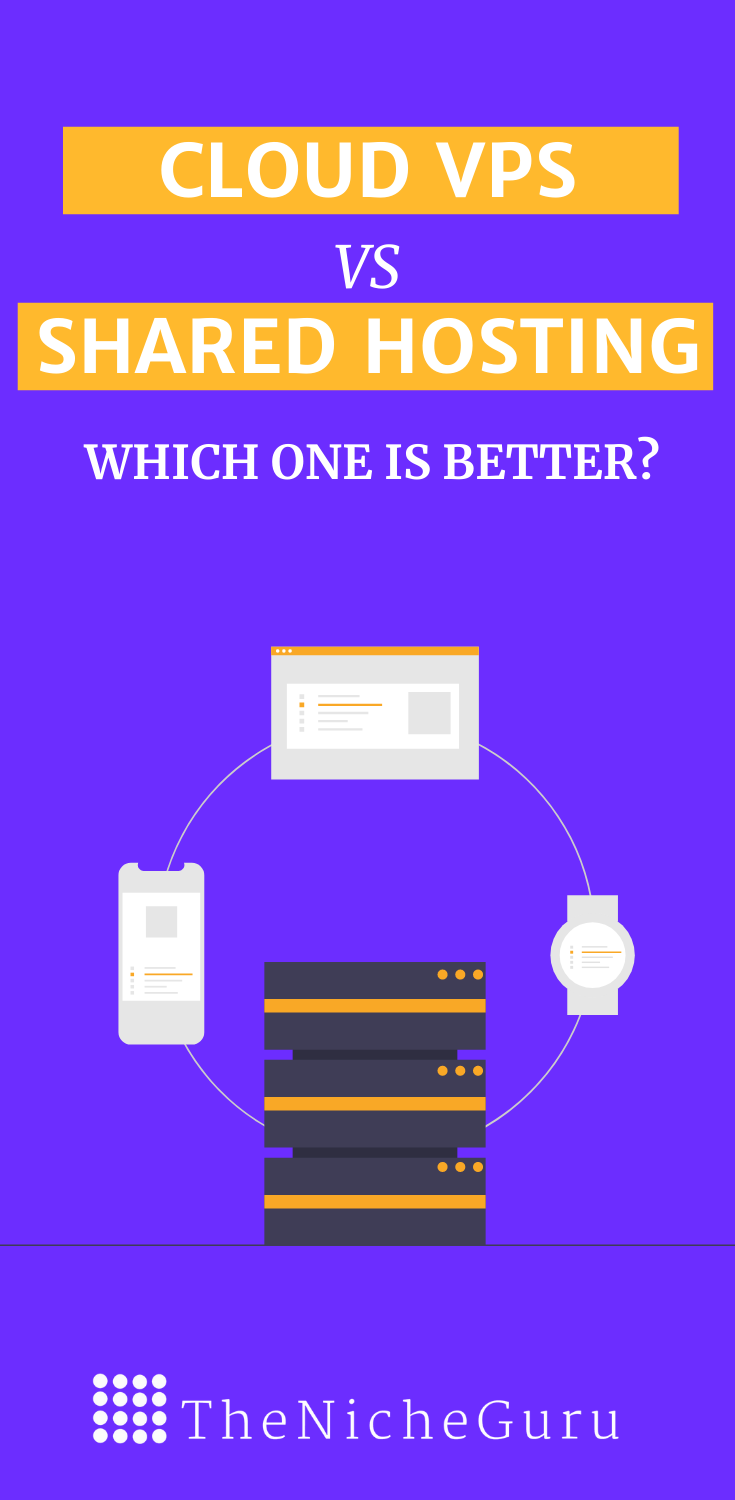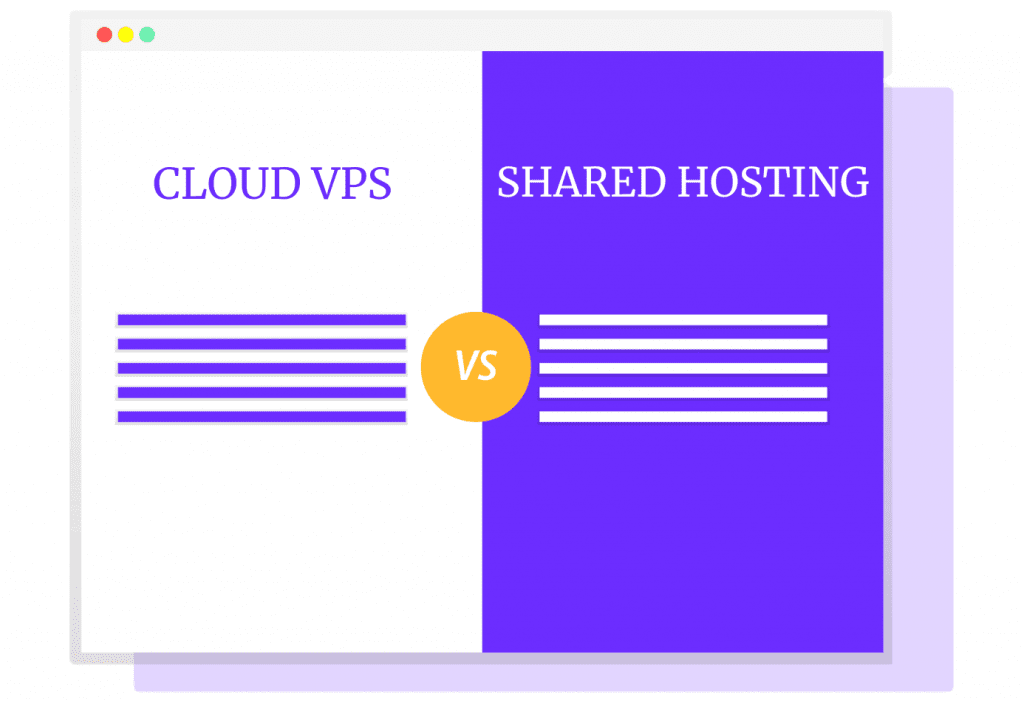Are you looking for a winner between Cloud VPS Vs Shared Hosting for your site?
Many consumers just take into account the price, ignoring other crucial factors that contribute to online success including a website’s functioning, degree of security, and level of assistance, among others.
It could be difficult to choose a hosting package for your website. You can be unsure about whether to choose a reliable option like a virtual private server or an affordable option like shared hosting (VPS). Fortunately, a thorough comparison of shared and VPS hosting will assist you in selecting the one that best suits your requirements.
- What is Cloud VPS?
- What is Shared hosting?
- Advantages of Cloud VPS
- Advantages of Shared hosting
- Disadvantages of Cloud VPS
- Disadvantages of shared hosting
- 1. Restricted access to resources
- 2. Sluggishness.
- 3. Your website could go down even on busy days.
- 4. There can be safety concerns.
- 5. A poor support team.
- 6. Website Speed Increased by Bad Neighbors.
- 7. What you can install is constrained.
- 8. No root access.
- 9. For SSL certificates, more funds are required.
- 10. Limited Unlimited.
- CloudVPS vs Shared Hosting
- VPS Vs Shared hosting: Conclusion
What is Cloud VPS?
KVM, or the Linux Kernel-based Virtual Machine, is the foundation of the Cloud VPS Hosting Platform, a unique cloud computing solution. It provides scalable, virtualized resources as a utility-based service. You only pay for what you really use, in other words. In a virtual, scalable environment, dynamic provisioning is possible. A new server may be accessed reasonably rapidly because the bulk of resources is easily reachable. The wonderful thing about this is that you can do it without relocating your data or altering your server settings.
You may grow your assets at any time to meet your particular needs by utilizing a broad network of servers. You have a limitless amount of computational power to manage the demand, even during traffic peaks.
CyberPanel is a superb cloud VPS that benefits the customer in every way thanks to its wealth of cutting-edge features.
What is Shared hosting?
Thanks to a hosting solution known as “shared hosting,” several websites may make use of the server resources (bandwidth, disc space, and memory allocation). Shared hosting, which is the most affordable hosting option, is excellent for small businesses with modest traffic blogs. If you choose shared hosting, the company gives you complete administrative access and handles all hosting-related duties such as software installation, security updates, maintenance, and backups.
The most fundamental and cost-effective type of hosting is shared hosting. Each tenant in a shared hosting environment has access to the resources of the same physical system. Simple, private websites and web apps with low traffic, few technical needs, and minimal performance or security requirements are acceptable for shared hosting.
Shared hosting is not the greatest option if your business requires customized modules, particular languages, or a unique MySQL database.
Advantages of Cloud VPS
Your server is balanced among several POPs using cloud architecture (points of presence). This makes it possible for the system to deliver your items even during periods of high demand significantly more quickly and flawlessly. most suitable for dynamic commercial websites and online stores.
Using cloud VPS hosting, a strong connection is never an issue. Even in the event that your original server is hacked or experiences a hardware problem, a bootable backup of your site will be able to be seen in many more circumstances. outstanding for important mission-driven websites.
When employing a cloud host, you may always keep a careful check on your resource use. You may quickly add extra to ensure that processes continue to operate smoothly when you see that you are getting close to any constraints, whether they be those for storage space, CPU, or RAM. This is typically helpful when starting marketing campaigns and websites that are rapidly growing.
Because backups are a vital component of your cybersecurity, it is almost always desirable to keep them off-site. When using a cloud hosting service, you have several options for where to store your site’s files and how to access them at any time.
The most economical cloud VPS options are available. The main cause of this is flexible pricing. There is no longer a need for you to overspend on resources that you don’t use. This is where the enhanced scalability comes in handy, enabling site owners to carefully and in advance manage their budget.
Advantages of Shared hosting
The key benefit of shared hosting is its low cost because numerous customers share a single server, which lowers server expenses.
The simplicity of use for beginners who aren’t familiar with hosting technicalities is correlated with the fact that you don’t have total control over your server.
Disadvantages of Cloud VPS
You can access nearly anything online because of cloud hosting. The reality is that anything that is linked to the internet is not safe, and even the largest companies are vulnerable to serious assaults and security problems.
One of the worst aspects of cloud hosting is this. Even the most well-known cloud hosting service cannot prevent this. A network of computers that are completely reliant on the internet to run is the foundation of cloud hosting. This implies that users will experience difficulties utilizing this service if there are any issues with internet access.
Most cloud servers can be accessed online, and the speed of your internet connection will determine how quickly you can connect to the server. The cloud hosting provider manages access to your private servers.
As long as your internet connection is reliable and fast, this won’t be an issue. You could get quite frustrated with it due to the poor pace of the cloud-hosted server, which is frequently caused by sluggish internet connections.
Cloud hosting is reasonably priced. However, there are occasionally some hidden charges that are only identified after the transaction has been signed. Therefore, in order to cover these costs, users must make significant financial sacrifices. As a result, the hosting plan ends up costing more than anticipated.
The efficiency of your cloud hosting providers is demonstrated by the seamless operation of your website when it is hosted in the cloud. Cloud hosting, however, cannot guarantee that your issues will always be resolved. You can occasionally still be dealing with issues from before you adopted the cloud, which might be quite costly for your company.
Disadvantages of shared hosting
You should be aware by now that shared hosting only allows your website to use a specific number of resources. As a result, you might not be successful if you try to add a resource-intensive activity to your website.
The feeling that their websites are sluggish is one of the most common complaints we get from business owners, and they often attribute this to their websites. However, with shared hosting, a shortage of resources is what keeps your website from operating as effectively as it might.
Shared hosting firms put up policies to start terminating processes if a site starts consuming more resources in order to prevent one website from exploiting the server’s resources. This means that if your website suddenly becomes well-known and receives a lot of traffic, it can crash. Your shared hosting provider will notify you and could even stop your website if it is using a lot of resources. Just consider how ridiculous it is that you suspended the website as if doing so was illegal after creating it in the hopes that it would gain popularity.
One of the major issues with shared hosting is this, therefore you should just stay away from it. Other websites on a server may be in danger if one website there is hacked. Additionally, every website on the server is exposed if the server itself is attacked. Your website is therefore vulnerable in a shared hosting environment until you make a mistake of your own.
Despite the assurances made by shared hosting firms that their services are simple, it’s possible that their support staff lacks sufficient expertise. They might not be able to assist you if there is a problem with your website. They’ll just restart it for you if it goes down. They might be unable to explain why it keeps dropping if you press them. You could also see right away that the person you are speaking with is not an expert in WordPress and is instead reading from a prepared FAQ. You would need to seek expert assistance from other sources for any more significant issues, which may cost hundreds of dollars. One major drawback of shared hosting is the conspicuous absence of competent assistance.
The performance of the server as a whole would suffer if your website is hosted on a server that also hosts a lot of other active websites, which would then have an impact on your website. Your website can experience a slowdown as a result of the popularity of both your website and other websites housed on your server.
Only a few apps can be installed on shared hosting servers. You might not be able to install anything if it’s not on the list.
You’ll feel the temptation to gain root access to your server as your website gains in popularity and complexity. However, it is not what the majority of shared hosting providers do.
Shared hosting has a low upfront cost, but as soon as you decide to add a feature, your costs go up. SSL certificates are a common illustration. Because many shared hosting providers charge for SSL certificates, your website will display a “Not Secure” notice. However, organizations like Let’s Encrypt offer these certificates without charge. Even if you utilize shared hosting, you still have to pay for them. The price of shared hosting itself also becomes a significant disadvantage when you take into account the cost of purchasing an SSL certificate.
Shared hosting providers spend a lot of money on marketing, and one of the benefits they frequently highlight is “Unlimited everything”. There are no restrictions on what they may describe as “Limitless,” which includes, among other things, the availability of unlimited bandwidth and emails. But you quickly realize that nothing is limitless. Your email accounts’ available space is constrained when more and more emails are received. You receive a warning when your website begins to use a lot of space. You might also get blacklisted if it starts consuming a lot of bandwidth. Therefore, misleading advertising is wrong; nothing is actually boundless.
CloudVPS vs Shared Hosting

Regardless of the type of website you administer, security is crucial. Despite some obvious differences, both hosting options are often reliable and safe ways to host your website.
When there is a problem with one website, shared hosting may have an impact on your website. Additionally, if other websites use an excessive amount of the available shared bandwidth, your website may slow. If a lot of people visit your website, this is essential.
Using a VPS might help you avoid this issue since the divided servers make sure that each website is functioning properly. You should think about your options if you lack the technical knowledge to maintain your virtual private server. It can cause a lot of extra issues if it is not properly addressed.
VPS hosting is preferred over shared hosting if you want more sophisticated capabilities for your website. In order to enhance the functionality and security of your website, you may thus install your own operating system, control panel, and apps. You now have server root access as a result of this. Consider Cyberpanel hosting, which has a user-friendly control panel already set up, if you want a simple setup.
The only preconfigured server configurations are available when utilizing a shared hosting plan, nevertheless. For people who don’t want to interfere with server maintenance activities on their own, this could be more useful.
You won’t need to undertake any technical upkeep if you decide to host your website with shared hosting. In order to prevent downtime and properly manage the back end, shared hosting companies will set up the shared server, install and update the appropriate software, and keep a watch on the servers.
However, controlling resources for VPS hosting is a little more challenging. To manage and administer it, you need a little more expertise. You may install and alter programs and software to improve the speed of your website since VPS hosting offers root access.
Comparatively speaking, scaling up VPS vs shared hosting is simpler than shared hosting. For a short-term strategy or a tiny website, shared hosting is a decent solution, but if your site has high traffic, you’ll see more performance issues.
If you can predict the growth of your website, VPS hosting may be a wise long-term investment because it allows you to scale effectively and rapidly.
When comparing VPS vs shared hosting, the latter is without a doubt the leader. The larger advantage of VPS hosting is, however, supported by its higher cost.
VPS hosting is somewhat more expensive than shared hosting plans, but it provides far more bandwidth and storage.
You might want to read next:
VPS Vs Shared hosting: Conclusion
Your hosting strategy is greatly influenced by the goals you have for your website. Compared to shared hosting, VPS hosting has advantages. However, both hosting choices have advantages.
Think about the features that interest you the most before selecting a web hosting package for your website.
Now it is your turn!

RELATED CONTENT




